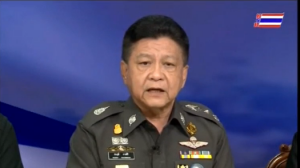
(Reuters) — Police said they had made significant progress on Wednesday (September 2) towards finding the mastermind of Thailand’s deadliest attack after an arrested man admitted being near the August 17 shrine blast and fingerprints tied him to the room of a suspected bomber.
The unidentified man arrested less than a kilometre from the Cambodian border on Tuesday (September 1) had told police he was not the bomber, but was in same area the night when a massive explosion killed 20 people.
“The man arrested was an important member of the group that planted the two bombs in Bangkok, in Rajaprasong and Sathorn bridge,” Thai police spokesman Prawut Thawornsiri said in a televised military statement.
The latest suspect was “definitely connected” to the attack and had stayed in the same Nong Chok area of Bangkok as another man arrested in a raid on Saturday (August 29) that found stacks of fake passports, TNT, C4 and fertiliser.
Prawut said the latest suspect’s prints were found on explosives in the same room.
“Today, the fingerprint result from investigators confirmed that the man’s fingerprints matched with (those found on) a bottle that contained explosive contents which was found in room 414 at Poon-anant Apartment. We are able to confirm that he was involved in the blast incident,” he added.
The investigation has gained momentum since the weekend raids, before which the authorities had little more than a low-resolution surveillance camera video of a man in a yellow shirt leaving a rucksack at the popular Erawan Hindu shrine moments before the blast.
The August 17 explosion ripped through a Hindu shrine in the Thai capital, killing 20 people and injuring more than 100. Fourteen foreigners were among those who died in the attack, which the military government said was aimed at an already ailing economy.
With no claim of responsibility, speculation has centred on sympathisers of Uighur Muslims, opponents of the military government, southern ethnic Malay rebels and foreign extremists.
Thailand’s forced repatriation of 109 Uighurs to China in July caused international outrage and saw protesters smash windows and ransack parts of its consulate in Istanbul. Many Uighurs transit through Southeast Asia to try to get to Turkey, which has a large diaspora.
Though many details remain unknown, the probe does appear to have a Turkish connection, with police interrogating the suspects through a Turkish translator and fake Turkish passports seized during one raid.







